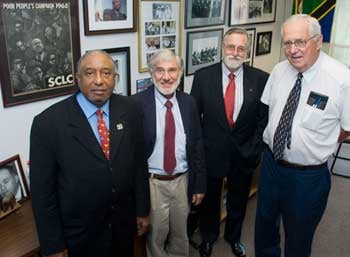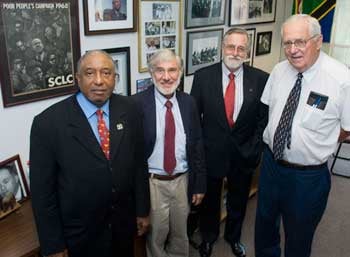 KINGSTON, R.I. — November 5, 2008 — A vital piece of American Civil Rights history told by Bernard LaFayette Jr., a distinguished scholar-in-residence and director of URI’s Center for Nonviolence and Peace Studies, is now available online from the University of Rhode Island. The life and times as recorded through the oral history of Civil Rights activist is now available on the University Library’s Special Collections website.
KINGSTON, R.I. — November 5, 2008 — A vital piece of American Civil Rights history told by Bernard LaFayette Jr., a distinguished scholar-in-residence and director of URI’s Center for Nonviolence and Peace Studies, is now available online from the University of Rhode Island. The life and times as recorded through the oral history of Civil Rights activist is now available on the University Library’s Special Collections website.
LaFayette was encouraged to share his life’s story by James Findlay, Professor emeritus of history, a noted historian of recent American religious history. He has used oral history extensively in his research and writing.
To ensure that LaFayette’s history was preserved, Findlay, with support from Tim Tierney, director of URI’s audiovisual center, recorded LaFayette’s story on videotape.
The interviews, recorded between 2002-2003, resulted in 12 hours of commentary and reflection on the life and work of LaFayette. Findlay interviewed the activist about his childhood, his years in the Civil Rights Movement, and his current activities, including his efforts to establish 10 nonviolence centers around the globe.
Findlay said that the footage is simply raw, unedited, historic data, primarily for the use of historians, students of the Civil Rights Movement, or even LaFayette himself if he ever sits long enough to write his autobiography.
Findlay, who resides in Peace Dale, worked with University Archives and Library Special Collections Associate Professor Sarina Wyant of Newport to prepare an index and transcripts of the footage to facilitate its use by historians. In 2008, thanks to a URI Foundation grant and funding from the Office of the President, the finding aid to the Bernard LaFayette Oral History Project is available along with the tapes online.
(http://www.uri.edu/library/special_collections/registers/oral_histories/lafayette/MssGr123f.html)
Pictured above
Oral history preserved: Bernard LaFayette Jr., Library Dean Dave Maslyn, President Robert L. Carothers, and Professor Emeritus James Findlay at LaFayette’s office.

